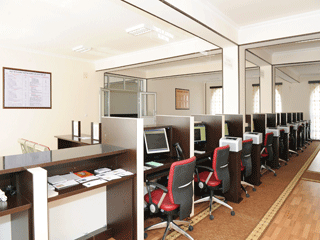Information and Telecommunication
In order to develop the information and telecommunication infrastructure, regular work is conducted regarding the extension of technical advantages of the information and telecommunication network, the far-reaching employment of communication system in production of information service, the swift convey of information, and improvement of the quality of information and telecommunication services In the Nakhchivan Autonomous Republic.
Being given into operation 155-megabyte/second communication channel through Trans-Asia-Europe cyber-optic main cable, information exchange such as big-capacious talk, video information, fast internet and etc., was launched, and video-conference connection in Nakhchivan State University among 7 foreign and domestic universities was established for the first time.
The completion of building of underground cyber-optic cable line between Nakhchivan and Turkey in 2007 will contribute to the big-capacious and high-tech communication connection. Furthermore, new mobile communication operators began to work, "Nakhtel" wireless communication network covering more than 70 percent of main land of the autonomous republic was given into usage, and wireless internet service was rendered.
 As a follow-up work, the completion of underground Nakhchivan-Turkey cyber-optic cable line has contributed to the establishment of capacious and qualitative communication relation.
As a follow-up work, the completion of underground Nakhchivan-Turkey cyber-optic cable line has contributed to the establishment of capacious and qualitative communication relation.
In January – September of 2022, there was a notable development in the information and communication sector in the Autonomous Republic of Nakhchivan, with the installation of 5 automatic telephone stations.
The production value of information and communication services in the same period reached 46,967,800 manats, surpassing the corresponding figure from 2021 by 2.9 percent.
In 2022, the production value of mobile communication services increased by 1.7 percent since the previous year and amounted to 30,266,600 manats.
For 9 months of 2022, a new Telecommunications Center was inaugurated in the village of Charchiboghan of the Sharur region, and a new Automatic Telephone Exchange with 672 lines was installed. Considering the demand for modern communication services, a total of 6 new HUAWEI NGN-type automatic telephone exchanges were installed in various locations, including Babek and Aliabad settlements in Nakhchivan city, the village of Garachuq, Baku Street in the Shahbuz region, the villages of Nehram and Shikhmahmud in the Babek region. This resulted in the provision of broadband internet services to around 4300 subscribers, while 1474 subscribers were connected through the new landline telephone lines.
Against the background of the implemented measures and increasing demand, the Internet capacities of the new generation automatic telephone stations operating in the city of Nakhchivan, and many villages of Julfa, Sharur, Babek, Ordubad, Shahbuz and Sadarak regions have been increased. This has created the opportunity to meet the demand for internet services for nearly 2800 subscribers.
To rebuild the telecommunications infrastructure and further improve the quality of services, consecutive works have been carried out in cities, regions, and villages. In the Ordubad region, the establishment of the telecommunications network infrastructure and the installation of a new generation Automatic Telephone Exchange with 96 lines in Pazmari village, as well as the renovation of the telecommunications network infrastructure in Unus and Kalaki villages, and in Hamzali, Varmaziyar, and Akhura villages of the Sharur region are ongoing in the respective directions.
At present, the State Program for Socio-Economic Development for the years 2023-2027, approved by President Ilham Aliyev, is successfully being implemented in various areas in the Autonomous Republic. One of these projects is the establishment of a Data Center, and project planning activities are already underway. Fiber-optic backbone networks are being laid across the entire territory of the Autonomous Republic, from the border with the Republic of Türkiye to the Zangezur corridor. This not only involves maintaining the existing infrastructure but also creating a new alternative network and will be highly effective in ensuring the transmission of data and providing users across the autonomous republic with high-speed internet and establishing alternative infrastructure.
As part of the State Program, another project involves the establishment of an IP telephony network. Work is being carried out in the direction of both increasing security and strengthening the infrastructure. Another project is the further expansion of this infrastructure and its application to all territories. A step to be taken in the high-speed internet direction is the implementation of the project for the application of Gigabit-capable Passive Optical Network technology, intended for more than 120,000 subscribers.
In this project, the implementation of the latest new technologies will ensure the delivery of speeds up to 1 gigabit per second to subscribers. Therefore, the significant increase in speed will have a great impact on cost reduction and improvement in quality.
